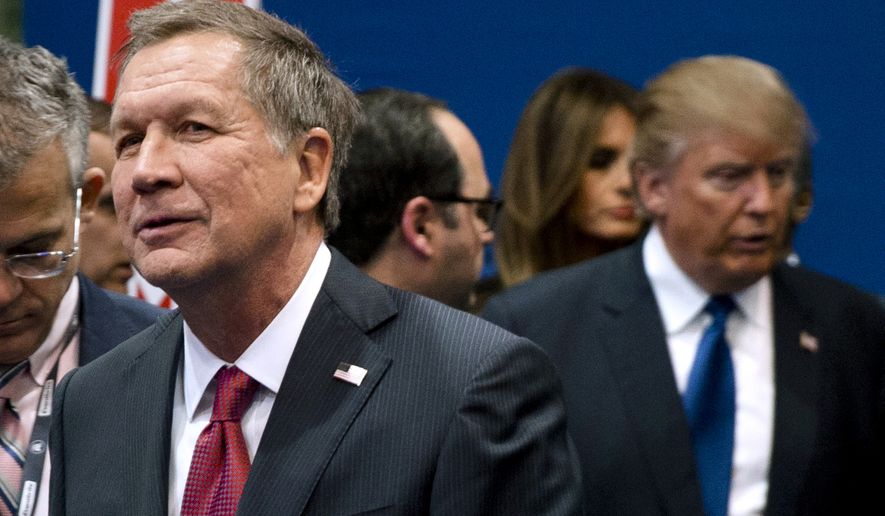OPINION:
CLEVELAND — Ohio Gov. John Kasich is roaming the streets of Cleveland, vowing not to participate in the GOP’s coronation of Donald Trump as their presidential nominee, but using the Republican convention as a way to meet with the early-primary state delegations and party officials and donors who could aid him should he choose to again run for president.
He refuses to endorse Mr. Trump — who both won and shattered the Republican primary vote record by 1.4 million votes — because Mr. Trump “divides our country.”
Yet, Mr. Kasich, over the weekend, wrote a scathing attack on Hillary Clinton in the Union Leader, New Hampshire’s largest paper, saying “Americans deserve more from their presidential candidates than pandering and divisiveness.”
So, I’m confused. Mr. Kasich is angry, that’s clear. But he’s offering no solution or help to the binary choice American voters will have in November — the choice between Mr. Trump and Mrs. Clinton. To say both are bad is to say nothing at all. It’s just to be angry and bitter that one lost the GOP primary.
But it’s not like Mr. Kasich is alone. Former Florida Gov. Jeb Bush wrote an opinion piece in The Washington Post over the weekend, with much the same tone.
“Donald Trump does not represent the future of our country — or the GOP,” the article was titled. Mr. Bush then went on to say Mrs. Clinton “doesn’t have any more interest in doing the hard work of forging consensus than her former boss does,” and that her foreign and economic policies are “disastrous.”
To get the country back on track, Mr. Bush prescribed term limits, a balanced budget amendment, line-item veto authority, and to reform the federal career service system — items that don’t necessarily speak to Republican voters right now.
Mr. Bush introduced these ideas to the American public when he was campaigning. He simply was unable to deliver the solutions with any dynamism, or with words that resonated with the Republican electorate.
“Let’s reintroduce civility, ideas and optimism back into politics,” Mr. Bush wrote. “Let’s find ways to campaign and govern inclusively. Let’s find ways to ease the angst and fear of people, without cynically feeding it.”
It’s a good idea, and one that I agree with, but again — how can we do this and when? We have two presidential choices come November and Mr. Bush isn’t one of them. He says he may write in a name or vote Libertarian, but both are as good as voting for Mrs. Clinton.
Mr. Trump does need the support of his base — the establishment class, which includes arms of the party Mr. Bush and Mr. Kasich represent. And whether Mr. Kasich or Mr. Bush realize it or not, they’ll never be able to win another election without the blue-collar, independent-leaning voters Mr. Trump has brought to the party.
The Republican Party consists of many things — fiscal conservatives, Evangelicals, tea partiers, neocons, and blue-collar workers. And all these factions — despite differences in their legislative and ideological priorities — must unify in order for any Republican to win the White House.
Donald Trump ran for the GOP presidential nomination as an outsider, on an anti-establishment message. He promised to bring his business acumen to the political sphere — that he wasn’t running to become a politician, but to reform the way politics worked.
But in the process, egos were bruised. The GOP establishment class lost their base — and their traditional playbook. Mr. Trump broke every rule in politics — he won despite not being favored by the party elites, he ran a national, not local, campaign, he ran with no legislative experience, and his gaffes never seemed to catch up to him. Mr. Trump also ran a dirty campaign — no hit was too low, no criticism out of bounds.
So it’s no wonder why his competitors have been slow to endorse Mr. Trump. Yet, despite his disruptive campaign, come November there’s only two choices — vote for Mrs. Clinton and another four years of the Obama administration, or Mr. Trump, who has the possibility of surprising, and has shown a desire to unify the party, both with his list of Supreme Court nominees and his vice presidential pick, Indiana Gov. Mike Pence.
For Mr. Trump’s former competitors, it’s time to stop pouting and come off the sidelines. Texas Sen. Ted Cruz did the right thing by coming to the convention, Florida Sen. Marco Rubio sent a video of support — a more measured, yet welcomed gesture.
Former Texas Gov. Rick Perry, Wisconsin Gov. Scott Walker, New Jersey Gov. Chris Christie and neurosurgeon Ben Carson — all who were beaten by Mr. Trump in the primary — have chosen to speak on behalf of Mr. Trump in Cleveland. Thank you. Former Pennsylvanian Sen. Rick Santorum and former Arkansas Gov. Mike Huckabee have come out in news interviews supportive of Mr. Trump.
To the rest: It’s time to stop acting like petulant children — you lost the primary fair and square. But please come back to the party and make your voices heard — you have a chance to help shape the next four years instead of driving the GOP off the cliff with your dissonance.
Mr. Trump may not be your first choice, but he’s your only choice. You signed a loyalty pledge to the party. Honor it.




Please read our comment policy before commenting.